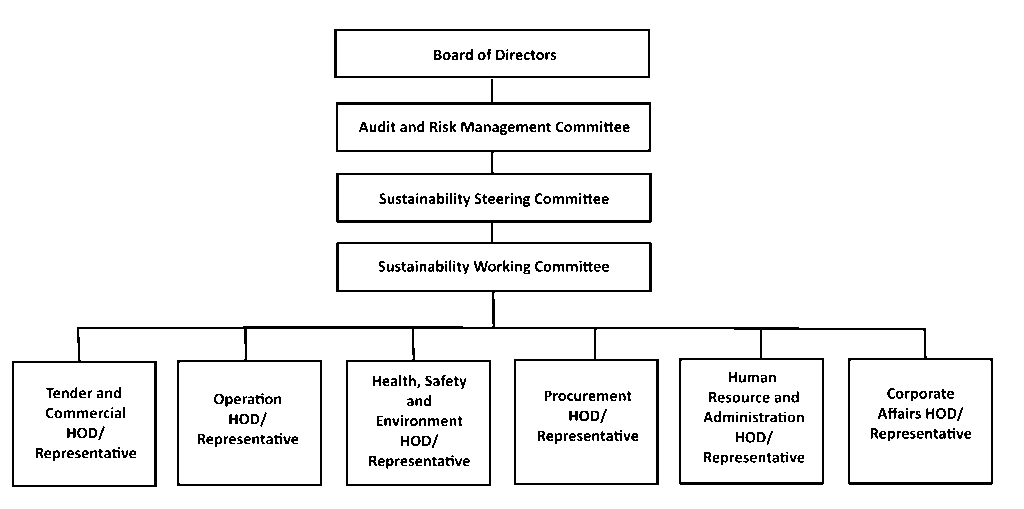Environmental
Climate Change
Our Commitment to a Low-Carbon Future
As a marine and offshore service provider, we are committed to embedding climate resilience and energy efficiency into every level of our operations. Our approach integrates governance, risk management, and innovation to mitigate carbon emissions, adapt to changing environmental conditions, and contribute to Malaysia’s transition towards a low-carbon economy.
Governance and Oversight
Climate-related responsibilities are embedded within our Sustainability Governance Structure, where the Board of Directors (BOD) provides strategic oversight of sustainability and climate-related risks and opportunities. The Audit and Risk Management Committee (ARMC) supervises the identification and mitigation of climate-related risks, while the Sustainability Steering Committee (SSC) coordinates the execution of climate initiatives through the Sustainability Working Committee (SWC).

ROLES AND RESPONSIBILITIES
Key roles and responsibilities of the Board of Directors
i. Provide strategic oversight of the Group’s sustainability governance, including climate-related strategies, policies, targets, and material sustainability matters.
ii. Provide strategic direction on the integration of sustainability, including climate-related risks and opportunities, into the Group’s business strategy and risk management process.
iii. Approve materiality sustainability matters and the content of the sustainability statement.
This structure ensures that climate considerations are integrated into enterprise risk management (ERM), consistent with ISO 31000:2018, and aligned with the Group’s Environmental Management System (ISO 14001:2015).
Energy Management and Emissions Reduction
We proactively manage energy use and emissions across our fleet through a combination of technological innovation, operational optimisation, and renewable energy adoption.
Key initiatives include:
- Ship Energy Efficiency Management Plan (SEEMP): Implemented on all applicable vessels to improve energy efficiency and reduce GHG emissions.
- Hybrid Engine Integration: The Keyfield Falcon is equipped with a diesel-electric hybrid engine, optimising energy loads, reducing fuel consumption, and cutting emissions.
- Solar Photovoltaic Installation: The Keyfield Wisdom is equipped with a 100 kWh solar system to supply renewable energy for onboard operations, certified by the Malaysia Book of Records as the largest installation on an offshore vessel.
- Biofouling and Hull Cleaning Management: Regular dry-dock cleaning cycles every five years to reduce drag, improve hydrodynamic efficiency, and lower carbon intensity.
Our target is to reduce emissions intensity by 3% in 2027, compared to baseline year 2026.
Pollution & Resources
Keyfield International Bhd. (“Keyfield” or “the Group”) recognises that managing pollution and natural resource use responsibly is fundamental to maintaining operational integrity and environmental compliance. As a marine and offshore service provider, Keyfield’s operations interact closely with the natural environment, with potential impacts on both marine ecosystems and atmospheric quality due to vessel emissions and offshore activities. The Group therefore applies structured governance, monitoring, and continual improvement to minimise emissions, prevent pollution, and use resources efficiently.
Governance and Oversight
Pollution and resource-management matters fall under the Group’s Sustainability Governance Structure. The Board of Directors provides strategic oversight, while the Audit and Risk Management Committee supervises risk identification and mitigation. Day-to-day implementation is undertaken by the Sustainability Steering Committee and the Sustainability Working Committee, with operational execution led by the Health, Safety and Environment (HSE) function. This integrated approach ensures accountability and alignment with Keyfield’s sustainability objectives.
Pollution Prevention and Emissions Control
Keyfield is committed to upholding the highest standards of environmental protection within its fleet and facilities.
- All vessels operate in compliance with MARPOL Annex VI, using Marine Gas Oil (MGO) to lower sulphur emissions and particulates.
- Each vessel maintains a Shipboard Oil Pollution Emergency Plan (SOPEP) to ensure effective management and mitigation of oil spills and Ballast Water Treatment System which protects marine ecosystems by preventing the spread of invasive species through discharged ballast water.
- The Group conducts regular dry-dock hull cleaning and maintenance to enhance vessel efficiency and reduce fuel consumption.
- In line with its decarbonisation initiatives, solar photovoltaic (PV) and hybrid-engine technologies are introduced on selected vessels to decrease reliance on conventional fuels.
Resource Efficiency and Waste Management
Keyfield continuously improves resource efficiency across energy, fuel, water, and materials.
- As part of its efforts to reduce and avoid waste, Keyfield Wisdom, one of the Company’s accommodation vessels, has been equipped with a food composting system designed to convert food waste into organic fertiliser. This initiative helps divert biodegradable waste from disposal streams, reduces environmental impact, and promotes circular resource use onboard.
- The Ship Energy Efficiency Management Plan (SEEMP) guides vessel energy optimisation and helps reduce fuel intensity.
- Waste management follows the Environmental Quality (Scheduled Wastes) Regulations 2005 and the Shipboard Garbage Management Plan, ensuring proper segregation, recycling, and disposal of hazardous and non-hazardous waste.
- The Group promotes responsible consumption through reduction of single-use materials, enhanced recycling, and sourcing environmentally responsible consumables.
- Water usage on vessels is closely monitored, with emphasis on conservation, reuse, and controlled discharge to prevent marine pollution.
- In FY2024, we initiated two E-Waste recycling campaigns in collaboration with licensed e-waste collector ERTH, ensuring the responsible recycling of e-waste.
Marine Environmental Protection
Operating in marine environments demands strict adherence to ecosystem protection standards. Keyfield ensures that all operations and charters comply with national and international regulations governing ballast water, bilge discharge, and chemical handling. Continuous staff training and periodic audits strengthen awareness and operational discipline to prevent contamination incidents.
Performance and Continuous Improvement
To measure progress, Keyfield monitors energy and fuel consumption, emissions, waste volumes, and recycling performance across its fleet. Baseline data for energy and emissions intensity established in FY 2024 now supports measurable reduction targets under the Group’s 2025–2027 Sustainability Plan. Performance data are reviewed periodically and disclosed in the Group’s Sustainability Statement, aligning with Bursa Malaysia’s Sustainability Reporting Guide (3rd Edition).
Looking Ahead
The Group will continue to:
- Expand renewable-energy and energy-efficiency technologies across its fleet.
- Formalise quantitative targets for emissions reduction.
By maintaining disciplined control of pollution sources and optimising resource use, Keyfield aims to operate as a responsible marine solutions provider that supports Malaysia’s low-carbon transition while safeguarding ocean health for future generations.
Supply Chain (Env)
The Group’s procurement practices are designed to integrate sustainability considerations such as emissions reduction, and resource efficiency throughout its supplier selection, evaluation, and performance review processes.
Governance and Framework
Keyfield’s sustainable-procurement governance is guided by its corporate environmental procedures and Quality, Health, Safety and Environment (QHSE) framework, aligned with ISO 14001:2015, MARPOL 73/78, and Annex VI, Regulation 13 requirements. Oversight rests with senior management and the QHSE Department, ensuring that environmental compliance, supplier monitoring, and lifecycle risk management are consistently embedded in all procurement decisions.
Procurement governance is overseen by the Senior Vice President of Fleet Management and supported by the QHSE Department, ensuring that environmental and sustainability standards are embedded across the vendor lifecycle—from registration and qualification to audit and review.
Environmental Responsibility in Procurement
Keyfield upholds a responsible procurement approach that integrates environmental management, sustainable sourcing, and value-chain decarbonisation. The Group recognises that suppliers and contractors play an essential role in advancing low-carbon and resource-efficient operations across the marine and offshore ecosystem.
In 2024, Keyfield expanded its supply-chain strategy to include Scope 3 greenhouse-gas (GHG) accounting, supplier engagement on environmental performance, and participation in national-level sustainability programmes to strengthen its contribution to Malaysia’s green-shipping transition.
Supplier Environmental Screening and Evaluation
All suppliers undergo environmental due diligence prior to inclusion on the Group’s approved-vendor list.
- Registration requires disclosure of environmental policies, certifications, and waste-management practices.
- Evaluation criteria include product quality, delivery performance, and specific scoring on Safety & Environmental concerns to ensure alignment with Keyfield’s sustainability objectives.
- Vendors that fall short of minimum expectations are required to implement corrective actions before requalification.
This systematic process ensures that Keyfield’s supply chain meets both operational and environmental performance standards.
Scope 3 Emissions and Lifecycle Accountability
Keyfield commenced reporting its Scope 1, Scope 2, and partial Scope 3 greenhouse gas (GHG) emissions in the FY2024 Sustainability Statement. In FY2025, the Group has expanded its carbon accounting boundary to encompass upstream and downstream activities, including vendor manufacturing, logistics, fuel consumption, and waste treatment.
Environmental aspects linked to supply-chain emissions are assessed in accordance with the GHG Protocol Corporate Value Chain (Standard) and IFRS S2 guidance. Data from vendor logistics, marine fuel usage, and waste-transfer records are used to estimate carbon intensity across the value chain. These efforts strengthen Keyfield’s readiness for full Scope 3 GHG disclosure in future reporting cycles.
Sustainable Procurement and Resource Efficiency
Keyfield applies a bulk-purchase and consolidated-logistics strategy whenever possible to reduce transport emissions, packaging waste, and operational energy intensity. Preference is given to suppliers with recognised environmental credentials such as ISO 14001 certification, classification-society approvals (ABS, BV, NKK), or national construction and marine licences. These practices directly mitigate upstream Scope 3 emissions associated with frequent, small-volume deliveries and inefficient supply routes.
Supplier Audits and Continuous Improvement
Supplier environmental compliance is verified through periodic QHSE audits. Findings are reviewed by management, and non-conformances are addressed through structured corrective-action plans. Results from audits inform supplier training, performance reviews, and retention decisions, driving continuous improvement in sustainability performance across the vendor base.
Industry Collaboration and Capacity Building
Keyfield actively participates in Malaysia’s maritime-sustainability ecosystem to align its procurement practices with national and global decarbonisation goals:
- PETRONAS Supplier Support Programme (PSSP) 2024 – Deep Dive Session on Sustainability The Group’s representative, Mrs Lim Kim Lee, attended the PSSP (West Malaysia) workshop to strengthen understanding of sustainable-procurement requirements and align supplier expectations with PETRONAS’ ESG framework.
These collaborations enhance supplier awareness, encourage shared best practices, and align Keyfield’s environmental objectives with national maritime-sustainability priorities.
